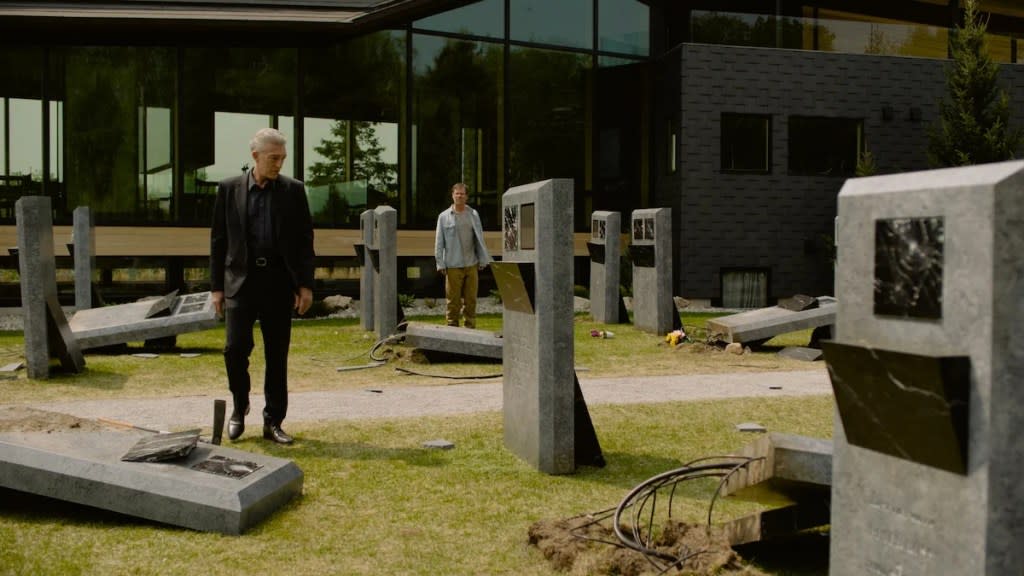‘The Shrouds’ Review: David Cronenberg’s Exploration of Grief Is as Sad as It Is Creepy

At most Cannes Film Festivals, a new film by David Cronenberg might well be the creepiest, most shocking film in the lineup – particularly if it’s about cameras that allow people to see their loved ones decompose after death, as “The Shrouds” is. But while “The Shrouds” is strong stuff and contains images not for the squeamish, at this year’s festival, Cronenberg-style body horror has been delivered more robustly by the likes of Coralie Fargeat’s “The Substance.”
By contrast, “The Shrouds” is restrained, even elegant. It’s a deeply personal look at loss that finds plenty of time to get creepy but never loses sight of the fact that it’s a movie about grief.
Specifically, it’s a movie about Cronenberg’s grief over the 2017 death of his wife. Not only is lead actor Vincent Cassel made up and styled to look as much like Cronenberg as possible, but in the opening stretch of the film, his character describes wanting to climb into the coffin alongside his wife, bereft at the idea that she’d be in the box all by herself; that’s an anecdote Cronenberg has told in the past about his own reaction to her death.
So even though it opens with the image of a nude, dead body in the grave, “The Shrouds” is not a return to the body horror of his earlier films like “Rabid,” “Videodrome,” “The Fly” and others. Its focus, which never wavers, is always on the feeling of loss, not the sight of gore.
Cassell plays Karsh, a businessman who has responded to the death of his wife (Diane Kruger) five years earlier by pioneering a technology that wraps corpses in a shroud that can transmit a 3D image of the body as it decomposes. Clients who so desire can bury their loved ones in Karsh’s cemetery, where each headstone includes a high-tech display screen that enables them to enter a code on the Shroud Cam app and view the body.
To say that Karsh is obsessed is an understatement: When he’s matched with a woman on an online dating site, he takes her to the restaurant at his cemetery on their first date, and invites her to amble out to his wife’s grave after lunch. (Needless to say, this pretty much torpedoes the relationship right from the start.)
“The Shrouds” isn’t shy about having us take a look, too, beginning with that nude, decomposing body, part of a nightmare that seems to be a regular occurrence for Karsh. But for the most part, it takes place in the restrained, quiet and elegant spaces in which Karsh lives. Everything is underplayed; except when he’s screaming himself awake from a nightmare, Karsh is a picture of calm.
But that calm is shattered early in the film when the cemetery is vandalized and access to the shroud videos is locked by unknown hackers. Is it random violence, a targeted attack from people who hate the very idea of the grave cam or some kind of sinister conspiracy that extends beyond that? And what are those little bumps that he can see when he zooms in to take a closer look inside his wife’s skull? Karsh enlists his brother in law, Maury (a very rumpled Guy Pearce, often shot in shadow), a tech whiz who helped set up the system to begin with before Karsh brought in a Chinese company.
At the same time, Karsh is trying to woo a big Hungarian client to fund a new cemetery in Budapest; “I want his rotting body in our cemetery,” Karsh explains. And from there, things get more complicated and more sinister, both on the personal front – where there’s tension, sexual and otherwise, between Karsh and his dead wife’s sister, Terry, also played by Kruger – and on the business side, where the Hungarian’s savvy wife tells Karsh not to trust Hunny, his AI assistant programmed to be like his late wife. (And yes, it’s Kruger behind the animation).
The movie unfolds as a nightmare of an interconnected surveillance world that reaches beyond the grave. Cronenberg approaches it in a stately manner, with Howard Shore’s largely restrained music and a hushed, quiet tone until Karsh’s nightmares begin to get the better of him. Then there are visions of his wife returning, losing pieces of her body one by one. “I’ve been in a strange, dark place since Becca died,” Karsh says at one point — and it’s no surprise that in Cronenberg’s hands, that place gets stranger and darker.
Cassel underplays the role relentlessly, leaving Kruger to handle a pair of dramatically different roles: Becca is a dream creation, Terry more grounded, funnier and hornier. (Plus Terry’s breasts are bigger than Becca’s, she points out in one of the many nude scenes.) Around them swirl an increasingly labyrinthine assortment of Russian hackers, a radiologist who’s also a Chinese agent, an Icelandic connection and much, much more as Karsh’s life turns into a geopolitical nightmare fueled by dread and paranoia.
Cronenberg’s last Cannes movie, 2022’s “Crimes of the Future,” was more graphic and more deliberately provocative; his one before that, 2014’s “Maps to the Stars,” was more freewheeling and purposefully entertaining. “The Shrouds” is sober, serious and profoundly sad Cronenberg. It’s still a hell of a ride, but it’s going down a road where there’s a heavy toll.
The post ‘The Shrouds’ Review: David Cronenberg’s Exploration of Grief Is as Sad as It Is Creepy appeared first on TheWrap.


